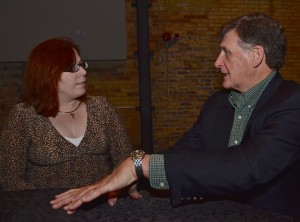Don McCreesh has the highest respect for people who join the committees and boards that run community groups.

They’re good, solid citizens, he says.
“The learning I got as a camp counsellor was that you leave your campsite a better place than it was when you arrived,” McCreesh said after giving a workshop at the Tannery Event Centre in Kitchener Oct. 24. “So I just translated that to community.”
“Secondly, I have not been on a board that I have not learned from and grown. It is a great personal development opportunity, and I’ve probably got as much out of it as I have given.’’
These days, however, it isn’t enough for volunteers to bring high ideals and passion into the boardroom. An expert in board governance, McCreesh told his audience of community-minded Manulife employees and invited guests that people who give money place greater-than-ever expectations on the groups that receive it.
They want accountability and transparency. The days when board members could glance over agendas and mutter approvals are past.
“It’s a great honour to be on a non-profit board,” McCreesh said. “But it is a job. You’ve got to attend meetings and pay attention.”
Volunteerism is part of the corporate culture at Manulife. With Capacity Canada as a partner, the company sponsors MatchBoard to connect Manulife employees to board vacancies in Waterloo Region and Toronto.
Manulife also supports Capacity’s governance boot camps, which attract executive directors and board chairs in the charitable non-profit sector.
McCreesh spoke to Manulife employees in Toronto Oct. 30, repeating the message that people should approach governance roles with their eyes wide open. Federal and provincial laws have changed. Governance standards covering for-profit corporations increasingly apply to the non-profit sector.
That raises the level of responsibility for governance roles.
So, in this new environment, what makes a good board member? McCreesh has some advice. Good directors:
•Read — never skim — agendas and background reports. They watch for events and trends that affect their agencies;
•Speak up at meetings. “One of the key roles of a director is to ask questions, ask questions, ask questions,” McCreesh said;
•Never slouch in their duties of care, loyalty and obedience to the aims of the organization;
•Stay alert for conflicts of interest, and step away from decision-making when they stand to gain from the outcome.
A well-run board, he added:
•Keeps a strategic focus, and stays out of day-to-day administration. “Nose in, fingers out,” he said;
•Allows a little “chaos” to give issues a thorough airing, and wraps up with a debrief of how the meeting went;
•Regularly checks in on the organization’s bylaws and articles of incorporation;
•Puts time and care into the registered charity information return (T3010) for the Canada Revenue Agency. A widely scrutinized public document, the return often contains errors, McCreesh said;
•Governs by consensus, and works to avoid splits leading to recorded votes.
Governance, he said, is an ongoing learning experience. More an art than a science.
“Just because we get it right now today doesn’t mean we’re gonna get it right five years from now,” McCreesh said.

